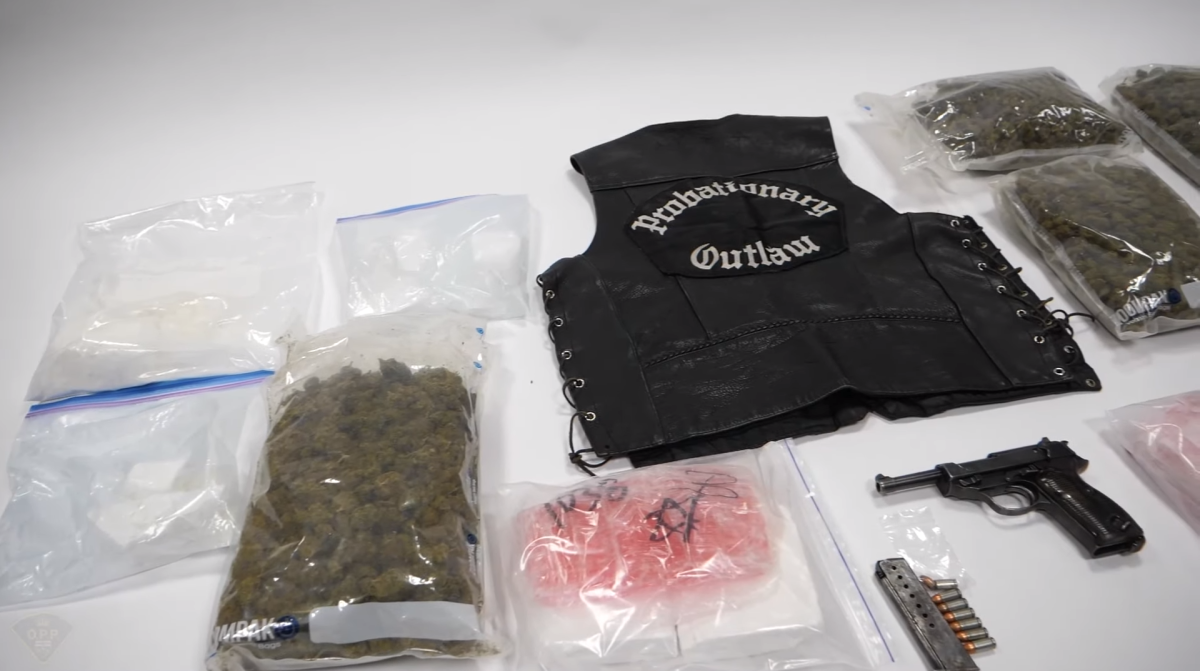Ten people are facing multiple charges in connection with an eight-month-long southern Ontario investigation tied to four criminal networks trafficking cocaine, firearms, explosives and cannabis, according to Ontario Provincial Police (OPP).

The probe dubbed Project Weaver led to 268 offences in raids executed on March 9 in London, Ancaster, Brantford and Barrie.
“The investigative team combined to seize 31 firearms, including multiple handguns, 81 grenades, two grenade launchers, three explosive projectiles, 22 other prohibited devices,” Det. Sgt. Scott Wade said in a briefing on Thursday morning.
The detective said the explosives seized were not Canadian military devices, but were made to look like military grade equipment.
“We are confident that the source has been identified and we want to assure the public that there’s no threat to your safety,” said Wade.
The firearms aspect of the investigation is ongoing, according to the OPP, however some of the seized weapons originated domestically in Canada with others from the United States.

Get breaking National news
Investigators say large quantities of cocaine, hash, psilocybin, MDMA and illegal cannabis and cannabis products were also confiscated.
“This confirms once again that illegal cannabis is a lucrative commodity and legalization has not removed the involvement of criminal networks in illegal cannabis markets,” said Wade.
Over $130,000 in cash and eight vehicles were also seized.
Wade said members of London’s Outlaws Motorcycle Club were a part of the four-member network, which included drug and firearm trafficking around the London area, Brantford and Hamilton.
Members of the Outlaws are accused of trafficking cocaine in large quantities in London while the second unnamed network allegedly trafficked firearms and cannabis the city.
A third network was responsible for trafficking firearms and cocaine in Brantford.
The fourth network was believed to have engaged in trafficking offensive weapons, explosive devices and cocaine in Brant County.
Wade said the groups were investigated as separate criminal networks and largely independent of each other but may have some interactions.
“Several members of the Outlaws motorcycle club were charged as a result of this investigation, and that will definitely impact their ability to operate in the London area,” Wade told Global News.
Three of the accused remain in custody while seven others were released with conditions.
A man from the Hamilton-Area is facing almost half of the charges (126) being laid in the operation.
The 32-year-old Ancaster native is accused of possessing and selling drugs and is facing 72 charges related to trafficking weapons and explosives.
Three people from London, two from St. Thomas, two from Brantford, and people from Strathroy and Paris have also been charged.
Some of the individuals arrested have criminal backgrounds and were already bound by existing firearms prohibitions, according to investigators.
All of the accused are expected in a London court on Friday.
Wade says 23 agencies involved in bike enforcement participated in Project Weaver.
Typically, the agencies focus on one per cent of outlaw motorcycle gangs which is about ten organizations with the Hells Angels the most prominent.
He says biker gangs in Ontario are not only involved in drugs and guns but a number of other levels of crime.
“I know across the province they’re involved in financial crimes, white collar crimes,” Wade said.
“We have evidence that motorcycle gangs are involved in stolen property rings, importation and others. Basically it runs the gamut of criminal offenses.”










Comments